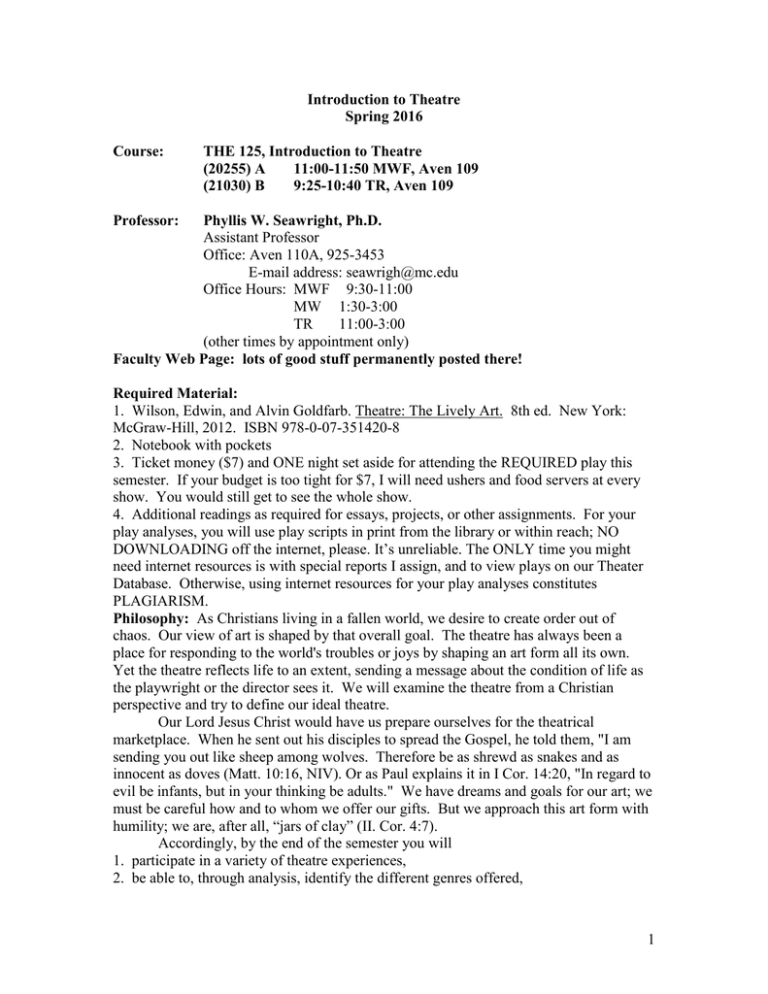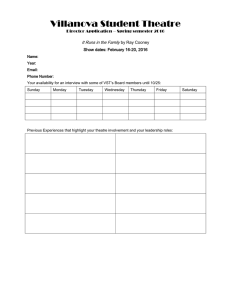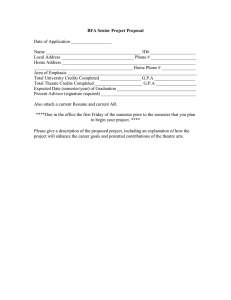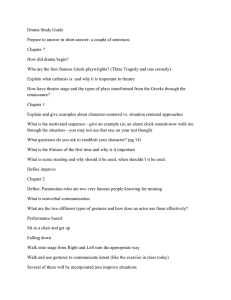Introduction to Theatre Spring 2016 Course:
advertisement

Introduction to Theatre Spring 2016 Course: THE 125, Introduction to Theatre (20255) A 11:00-11:50 MWF, Aven 109 (21030) B 9:25-10:40 TR, Aven 109 Professor: Phyllis W. Seawright, Ph.D. Assistant Professor Office: Aven 110A, 925-3453 E-mail address: seawrigh@mc.edu Office Hours: MWF 9:30-11:00 MW 1:30-3:00 TR 11:00-3:00 (other times by appointment only) Faculty Web Page: lots of good stuff permanently posted there! Required Material: 1. Wilson, Edwin, and Alvin Goldfarb. Theatre: The Lively Art. 8th ed. New York: McGraw-Hill, 2012. ISBN 978-0-07-351420-8 2. Notebook with pockets 3. Ticket money ($7) and ONE night set aside for attending the REQUIRED play this semester. If your budget is too tight for $7, I will need ushers and food servers at every show. You would still get to see the whole show. 4. Additional readings as required for essays, projects, or other assignments. For your play analyses, you will use play scripts in print from the library or within reach; NO DOWNLOADING off the internet, please. It’s unreliable. The ONLY time you might need internet resources is with special reports I assign, and to view plays on our Theater Database. Otherwise, using internet resources for your play analyses constitutes PLAGIARISM. Philosophy: As Christians living in a fallen world, we desire to create order out of chaos. Our view of art is shaped by that overall goal. The theatre has always been a place for responding to the world's troubles or joys by shaping an art form all its own. Yet the theatre reflects life to an extent, sending a message about the condition of life as the playwright or the director sees it. We will examine the theatre from a Christian perspective and try to define our ideal theatre. Our Lord Jesus Christ would have us prepare ourselves for the theatrical marketplace. When he sent out his disciples to spread the Gospel, he told them, "I am sending you out like sheep among wolves. Therefore be as shrewd as snakes and as innocent as doves (Matt. 10:16, NIV). Or as Paul explains it in I Cor. 14:20, "In regard to evil be infants, but in your thinking be adults." We have dreams and goals for our art; we must be careful how and to whom we offer our gifts. But we approach this art form with humility; we are, after all, “jars of clay” (II. Cor. 4:7). Accordingly, by the end of the semester you will 1. participate in a variety of theatre experiences, 2. be able to, through analysis, identify the different genres offered, 1 3. have an appreciation of how theatre enriches our lives, and 4. exercise discernment in what we view. Rationale: This course explores performance and theatre primarily as an art form but also as a means of communication experienced on a daily basis. This course will provide you with the basic knowledge of theatrical conventions, theatre history and actual experience that is necessary to participate in the enjoyment of the art form. It will also teach you to recognize and identify dramatic elements in theatre. Course Objectives: The primary objectives of this course are: 1. to give you a working vocabulary of the conventions of theatre. 2. to give you a greater knowledge of theatre history. 3. to give you practical experience in the theatre. 4. to give you practice in writing on the collegiate level. 5. to review general principles of theatre etiquette. Evaluation: You will be evaluated on the following assignments: Test 20% Play Analyses (4) 40% Play Attendance 10% (Attendance at my show, Twelfth Night.) Original Monologue 10% (Performed in class) Broadway Research 10% (final project) Daily Grades & Professionalism 10% (see below for details) 100% Grading Scale: A = 90-100 B = 80-89 C = 70-79 D = 60-69 F = below 60 exceptional above average average below average failing Play Analyses: You will have several written projects due in this class. I will give you specific guidelines for format and grading. I will grade your written projects on style as well as content. YOU MUST NOT USE outside sources for this writing (see academic integrity statement below). You must use proper grammar; I taught English too long to overlook glaring errors. Most of our play analyses will be written in class. If you miss an in-class writing test for an excused absence, we will try to reschedule it within ONE week. Otherwise, the makeup will take place ON EXAM DAY. If you miss a scheduled makeup day, you will get a zero on that assignment. For other written assignments, you must TYPE them or you will receive a lower grade. I DO NOT ACCEPT PAPERS VIA EMAIL. Late work will be penalized 10 points for EVERY CLASS DAY that it is late. Each paper should have your name, class and the name of the assignment in the upper left-hand corner of the first page. Papers should be stapled together; no folders, please. 2 To encourage originality and to combat plagiarism, the college now subscribes to Turnitin.com, a website that collects all papers and highlights passages which have been improperly used or not documented. I will give you one week following each due date to access this program and upload your paper. Beyond that, I will not accept the paper, and you will earn a 0. We will discuss more specifics in class. Play Attendance and live Play Analysis (20% OF TOTAL SEMESTER GRADE): You will notice that 20% of your grade depends upon your attending this semester’s LIVE FACULTY-DIRECTED play and then writing an analysis of it. No excuses for missing the play are acceptable. If you are an actor or a crew member, you will have to make sure that you see the whole play in a final rehearsal. To prove that you attended the play, you must have your program signed by ME after the show, and turn it in with your play analysis. Here are the details of the event: Twelfth Night by William Shakespeare, directed by Phyllis W. Seawright The 2015-2016 Mississippi College Shakespeare Festival production Jennings Hall Courtyard (or Alumni Gym if inclement weather) Thursday, March 31, 2016, 10:00 a.m. school matinee Friday, April 1, 2016, 10:00 a.m. school matinee Friday, April 1, 2016, 7:00 p.m. Saturday, April 2, 2016, 7:00 p.m. Sunday, April 3, 2016, 2:30 p.m. If you fall in love, will you lose your identity or find out who you really are? Shakespeare presents the question through his trademark comic mayhem. We present the play in our own Globe Theater, the romantic courtyard of Jennings Hall. Tickets: $7 for students, $10 for adults. Groups of 20 or more are $4 each. One chaperone is free for every 10 students in youth groups; bus driver is free. (Ticket price includes refreshments at intermission.) For more information contact Phyllis W. Seawright at 601.925.3453 or seawrigh@mc.edu . Daily Grades & Professional Conduct (10% of the total grade): This class is a combination of lectures, discussions, informal and formal presentations, and an optional practicum. The practicum can give you experience in stage management or performance in this semester’s major production by the Mississippi College Tribal Players. In addition, as a member of this class, you may sign up for house management duties (i.e., ushering, concessions) during the play’s run. Both the practicum and the one-night duties are voluntary and will earn different levels of credit. The required class activities encompass a variety of performance options. For one assignment in this category, you will perform a monologue or a scene (from a published work). And there will be other random readings and skits we do as a class. Pop-quizzes will be drawn from reading assignments or previous notes. (There is no make-up for a daily quiz.) Occasional in-class writings will also count in this category. 3 Professional Conduct: I regret that I find it necessary to add this punitive category in print. For each of the following infractions, I will deduct 10 points: Failure to notify me in advance of illness or school-related absence when an assignment, a test, or a performance is imminent Tardiness Having a cell phone visible (includes any telephone earpieces also) Text messaging Earphones with any portable music device Talking out of turn Nail-clipping Eating Sleeping Using a laptop without my permission These penalty points may not be made up through the extra credit policy. This one category can ruin a good overall average. If any of these behaviors become habitual, you will have to drop the course altogether. Make-up Policy: Students with unexcused absences cannot make up tests or in-class writings. Pop-quizzes and daily grades cannot be made up for either excused or unexcused absences. EXTRA CREDIT: I will offer up to 10 points extra credit for attending campus lectures, music performances, student drama productions, etc. You will need to have the event program initialed by a faculty member in attendance, AND you will need to write a paragraph describing the event. These extra credit opportunities will be worth 2 points each, to be applied to a test or a play analysis grade. Working as a cast or crew member in a production also earns extra credit at a higher level, depending on your commitment. In addition, you may attend a production at another college in our area or at one of our local community theatres, or one presented by a touring company at a major theater. For these off-campus shows, you can earn 5 points for turning in your ticket stub, program, and a 1-page review of the show. Class Attendance: This is a real-time, physical class, not an on-line class. I follow the attendance policies in the college catalog. Missing class penalizes you in many ways: late grades, zero daily grades, etc. Twelve absences in an MWF class or eight absences in a TR class result in failure. I count three tardies as one absence. After the fifth MWF absence or third TR absence, every absence deducts 2 points OFF your semester average. If you need to drop the class, be aware that according to the administration, “Tuition refund cannot be made on dropped classes after the first week of classes.” Academic Integrity: Why would you cheat yourself of a true theatrical and educational experience? There is no substitute for honest work. DO NOT USE OUTSIDE 4 SOURCES to write your play analyses. You are fully capable of reading and understanding a play; I want to know what YOU think, not what some literary critic thinks. Please follow the policies as outlined in the current Mississippi College Undergraduate Catalog and University Policy 2.19, or I will be forced to penalize you far beyond what either one of us wishes. Courtesy and Class Etiquette: AS A COURTESY TO ME AND TO THE OTHER STUDENTS, PLEASE TURN OFF CELL PHONES AND BEEPERS DURING CLASS. If you have a sick relative and are expecting a call, please switch your phone or beeper to the silent mode and sit near the door. DO NOT MAKE APPOINTMENTS (advisor, doctor, work, other campus activities) that conflict with class time. You will be counted absent if you leave class early or arrive late because of such an appointment. Online Learning Component: In addition to traditional classroom-based learning, this class uses the course management system MCMoodle to facilitate learning online. You have access to MCMoodle by virtue of your enrollment in this course. MCMoodle can be accessed at http://moodle.mc.edu. Your assigned MC email address and password serve as your login information. You are expected to be able to navigate MC Moodle and complete any activities assigned through MCMoodle by the instructor. Tutorials on how to navigate MC Moodle are available on the MCMoodle home page and on the department’s website. You may also contact your instructor for help. Other Policies: A. If you are a student athlete, please give me advance notice for preparing your grade and attendance reports. If anybody needs special accommodations for taking tests, please tell me well in advance of the test date. I discourage a student from taking an incomplete grade in an introductory-level class. IF YOU ARE A GRADUATING SENIOR, you are not automatically exempt from my final exam. It is my prerogative to decide that. Please consult the current MC undergraduate catalog, and then talk to me. B. Early Alert System Mississippi College has adopted the practice of finding students early in the semester who may be exhibiting behaviors that could ultimately have a negative impact on their academic progress. These behaviors are often called “red flag” behaviors and include, but are not limited to, excessive absences, poor test grades, and lack of class participation or evidence of non-engagement. Identifying these behaviors early gives the instructor the opportunity to raise the “red flag” on behalf of a particular student so that the student can take the appropriate action to redirect his/her progress. The system alerts the student, the student’s advisor, and the Office of Student Success. These messages are intended to help a student recognize an area of concern and to encourage him/her to make some choices to improve the situation. When a student receives an Early Alert message, the student should quickly make an appointment to talk with his/her professor about the situation. Also, students can make full use of the Office of Student Success to set academic goals and connect to campus resources. 5 C. Students with Disabilities In order for a student to receive disability accommodations under Section 504 of the Americans with Disabilities Act, he or she must schedule an individual meeting with the Director of Student Counseling Services immediately upon recognition of their disability (if their disability is known they must come in before the semester begins or make an appointment immediately upon receipt of their syllabi for the new semester). The student must bring with them written documentation from a medical physician and/or licensed clinician that verifies their disability. If the student has received prior accommodations, they must bring written documentation of those accommodations (example Individualized Education Plan from the school system). Documentation must be current (within 3 years). The student must meet with SCS face-to face and also attend two (2) additional follow up meetings (one mid semester before or after midterm examinations and the last one at the end of the semester). Please note that the student may also schedule additional meetings as needed for support through SCS as they work with their professor throughout the semester. Note: Students must come in each semester to complete their Individualized Accommodation Plan (example: MC student completes fall semester IAP plan and even if student is a continuing student for the spring semester they must come in again to complete their spring semester IAP plan). Student Counseling Services is located on the 4th floor of Alumni Hall) or they may be contacted via email at mbryant@mc.edu . You may also reach them by phone at 601-925-7790. Dr. Morgan Bryant is director of MC Student Counseling Services. DISCLAIMER: I reserve the right to modify these policies and syllabus as the need arises. Daily assignments will be handed out in class. SYLLABUS (tentative): More detailed assignments will be given in class. Week 1, Jan. 11-15, 2016: Meet & Greet. Scan and take notes on Chapters 1 & 2. TBA: Excursion Day: During class, we’ll meet in Aven 109 first, then go to the Speed Library and locate the stacks in the basement where you can find plays for your monologues (on your own time). Then, we’ll go to the Gore Art Gallery and find a piece of sculpture or other visual art for you to write about (see following instructions): Here’s what to write for me after you have chosen one (1) of the pieces: In your own handwriting, describe the setting of the work of art as you approach it. What is your first impression? What draws you into it? What emotional effect does it have on you? What would you tell somebody else about it? Please turn this paragraph in by the end of class. 6 ***Besides the textbook readings, you may read some of your plays in hard copy (found in the basement stacks of the library next door or in the reserved materials section) for your play analyses. (Writing Guidelines are in a separate handout.) Look up a playwright using MICAL, or browse through the following areas: Call Number & Genre 808.2 Anthologies of Drama, etc. 812 American Drama 820 British plays mixed with criticism, poetry, prose 822 British drama 832 German drama 842 French drama 852 Italian drama 862 Spanish drama 872 Roman drama 882 Greek drama 892 World drama (Middle Eastern, Asian, African) Week 2, Jan. 18-22: [Monday is the MLK holiday.] MTW: Chapters 3 & 4 More excursions TBA this week. Have your MC account username and password with you. We will go to the library for a tutorial on using MICAL and our databases. Week 3, Jan. 25-29 Chapter 5 on Acting Chapter 6 on Directing Chapter 14, Modern Theatre (selected pages) Chapter 15, Today’s Diverse Global Theatre (ditto) Modern Realism & Domestic Drama: A Raisin in the Sun by Lorraine Hansberry. Week 4, Feb. 1-5: More Raisin, then take an in-class writing test on it, combination objective and short essay. (open notes) Week 5, Feb. 8-12: MTW: Chapter 7, Theater spaces, indoors and outdoors. Chapters 8 & 9: Spectacle: props, costumes, lighting. Greek Drama: Continue Ch. 3 & 4, begin Ch. 10 and Oedipus the King (Oedipus Rex) by Sophocles. For Oedipus, you’ll do a monologue from it FIRST, then we’ll watch it in class, and then we’ll write about it in class. (combo objective & short essay) 7 TR: ***Here’s what you’ll need to do for this first monologue performance: DAILY GRADE: You perform a monologue from Oedipus Rex, chosen from any translation, any role. You must do the following: a. bring a HARD COPY of the monologue, b. present it with your best reading, and c. perform it using the best of your abilities. Costume is optional AND extra credit. d. Include the bibliographic citation of your source at the bottom of your HARD COPY. You will not be allowed to perform unless you satisfy this requirement. Week 6, Feb. 15-19: MT: Finish Oedipus monologues. WRF: Begin watching Oedipus the King/Oedipus Rex. Week 7, Feb. 22-26: MTW: Finish watching Oedipus. RF: Write about it, with a short test combining objective & short answer questions. (open notes) Week 8, Feb. 29-Mar. 4: Medieval Drama: More of Chapter 10: the Quem Quaeritis, Everyman. We’ll read these in class, and then you’ll write an original monologue based on Everyman and perform it. (separate handout for this monologue, worth 10%.) [SPRING BREAK IS MARCH 7-11] Week 9, March 14-19: MTW: Finish reading Everyman. RF: Perform your Original Monologues! Week 10, March 21-25: Review for the mid-term. Take the mid-term. Renaissance Drama: Scan Chapter 12, focusing on Italian and English styles. Week 11, March 28-April 1: My SHOW is this week!!! [Monday is our Easter holiday.] TW: Shakespeare and Metadrama: Ch. 12 and more! RF: Twelfth Night by William Shakespeare, directed by Phyllis W. Seawright The 2015-2016 Mississippi College Shakespeare Festival production Jennings Hall Courtyard (or Alumni Gym if inclement weather) Thursday, March 31, 2016, 10:00 a.m. school matinee Friday, April 1, 2016, 10:00 a.m. school matinee 8 Friday, April 1, 2016, 7:00 p.m. Saturday, April 2, 2016, 7:00 p.m. Sunday, April 3, 2016, 2:30 p.m. If you fall in love, will you lose your identity or find out who you really are? Shakespeare presents the question through his trademark comic mayhem. We present the play in our own Globe Theater, the romantic courtyard of Jennings Hall. Tickets: $7 for students, $10 for adults. Groups of 20 or more are $4 each. One chaperone is free for every 10 students in youth groups; bus driver is free. (Ticket price includes refreshments at intermission.) For more information contact Phyllis W. Seawright at 601.925.3453 or seawrigh@mc.edu . Week 12, April 4-8: De-brief on my play. Write the play analysis in-class. You must have your program with you or you will receive a zero (0) for this assignment. Begin The Taming of the Shrew by William Shakespeare. Week 13, April 11-15: Finish The Taming of the Shrew. Write about it in-class. ***Spring One-Acts are this weekend, April 14 & 15, tentatively. Shows TBA. Extra credit! Week 14, April 18-22 MTW: Musical Theater, clips & notes. Be able to identify a book musical, a concept musical, and a juke-box musical. Asian drama, clips & notes. RF: Begin Broadway Theater Reports. Week 15, April 25-27 Finish Broadway Theater Reports. Thursday, April 28, is the campus-wide study day before exams. Friday, April 29, exams begin per the posted exam schedule. 9




